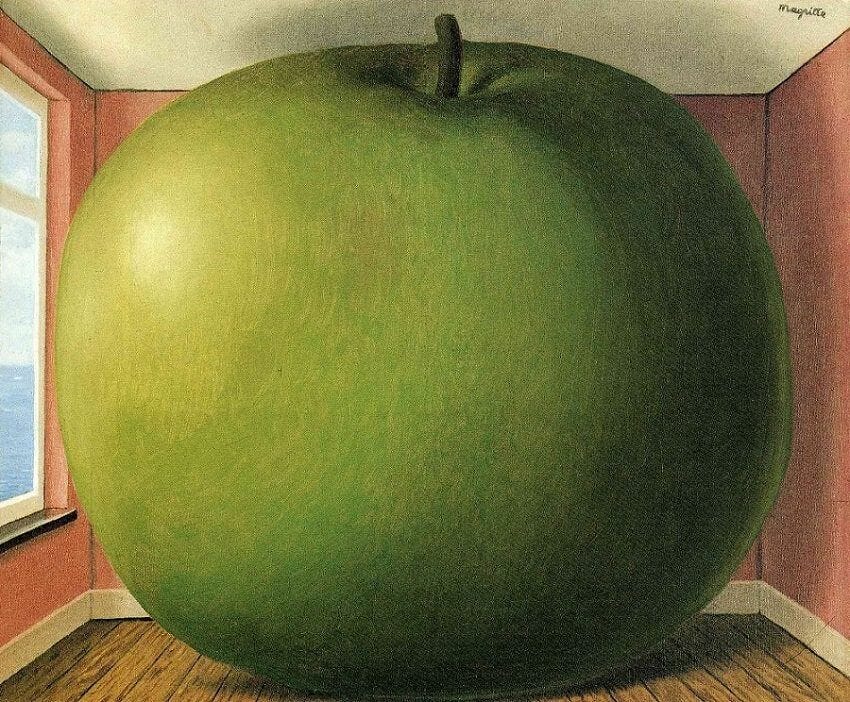#10. APPLE / POMA
Laughter is only an echo of a distant explosion within you / El riure és l'eco llunyà d'una explosió interior
Some think that striking is to strike;
But striking is not to strike, nor is killing to kill.
He who strikes and he who is struck—
They are both no more than a dream that has no reality.
No thinking, no reflecting—
Perfect emptiness...
Victory is for the one,
Even before the combat
Who has no thought of himself,
Abiding in the no-mind-ness of Great Origin.
An extract of a versified epigram (waka) based on 31 syllabes of Shinkage-ryu's training, a Chinese swordsman school from the 17th century.

APPLE
For several ancient cultures, apples represent knowledge and wisdom. In Celtic mythology, apples are the fruit of science, magic and revelation. In ancient Greece, the golden apples of the Garden of the Hesperides were a fruit of immortality. For the Greeks, it was also a gift of love. Paris gave an apple to Aphrodite and the goddess introduced him to Helena. An apple as the spark of a conflict is repeated in the Abrahamic traditions. Although the Book of Genesis refers to a forbidden fruit, a Latin etymological confusion (malus ‘apple, malum ‘evil') introduced the image of sin as an apple in the collective imaginary. The dogmatic interpretation of the Bible is the origin of the violence and repression against women. A non-rigid approach to the Book of Genesis shows that God wanted Adam and Eve to eat from the tree of knowledge of good and evil. It’s well known that if you want to avoid something, the last thing you must do is to say that it is forbidden. Moreover, if you are God why not avoiding the tree of knowledge to be grown on Paradise? Eve was the curious and creative character of the sacred tale and she was also generous.

I had never known this before, but now I know it, and you know it: laughter can be of different colors. It is only an echo of a distant explosion within you. It may be festive—red, blue, and golden fireworks; or—torn fragments of a human body flying up.
We by Ievgueni Zamiatin

Alguns pensen que donar cops consisteix en donar cops;
però donar cops no és donar cops, com matar tampoc és matar.
El que dóna cops i el que rep els cops,
Tots dos no són res més que un somni que no té realitat.
Ni pensament, ni reflexió.
El buit perfecte...
La victòria és per qui
Inclús abans de lluitar
No pensa per res en si mateix,
I accepta el no-res del Gran Orígen.
Extracte d’un epigrama en vers (waka) de 31 síl·labes d’una de les escoles d’esgrima xineses més importants del segle XVII, la escola Shinkage-ryu's.

POMA
La poma és concebuda en diverses cultures com un mitjà d'accés al coneixement. En les tradicions celtes és una fruita de ciència, de màgia i de revelació. En la grega és la fruita de l'arbre de la vida del jardí de les Hespèrides, les pomes daurades del qual atorgaven la immortalitat. Pels antics grecs també era un regal d'amor. Paris va escollir a Afrodita donant-li una poma i la deessa el va recompensar presentant-li Helena. La poma com a desencadenant d’un conflicte es repeteix en la tradició judeocristiana. Tot i que el Gènesis parla de fruita prohibida, un equívoc etimològic del llatí (malus ‘poma', malum ‘mal') va provocar que la poma s’instal·lés en l’imaginari col·lectiu com a imatge del pecat. La interpretació dogmàtica de la Bíblia és l’origen de la repressió i la violència contra la dona. Una lectura sense rigidesa del Gènesi permet adonar-se que Déu volia que Adam i Eva mengessin la fruita de l'arbre del coneixement del bé i el mal. És ben sabut que si vols evitar que algú faci una cosa, l’últim que has de fer és dir-li que està prohibit. A més, si ets Déu pots estalviar-te de fer créixer l’arbre del coneixement al bell mig del Paradís. Eva era el personatge curiós i creatiu del història sagrada i, a sobre, era generosa.

Abans no ho sabia i ara sí, i vosaltres també ho sabeu: hi ha riures de diversos colors. El riure és l'eco llunyà d'una explosió interior: poden ser coets de festa, vermells, blaus o daurats, o bé fragments del cos humà que surten a volar.
Nosaltres de Ievgueni Zamiatin




Gràcies, Pol.